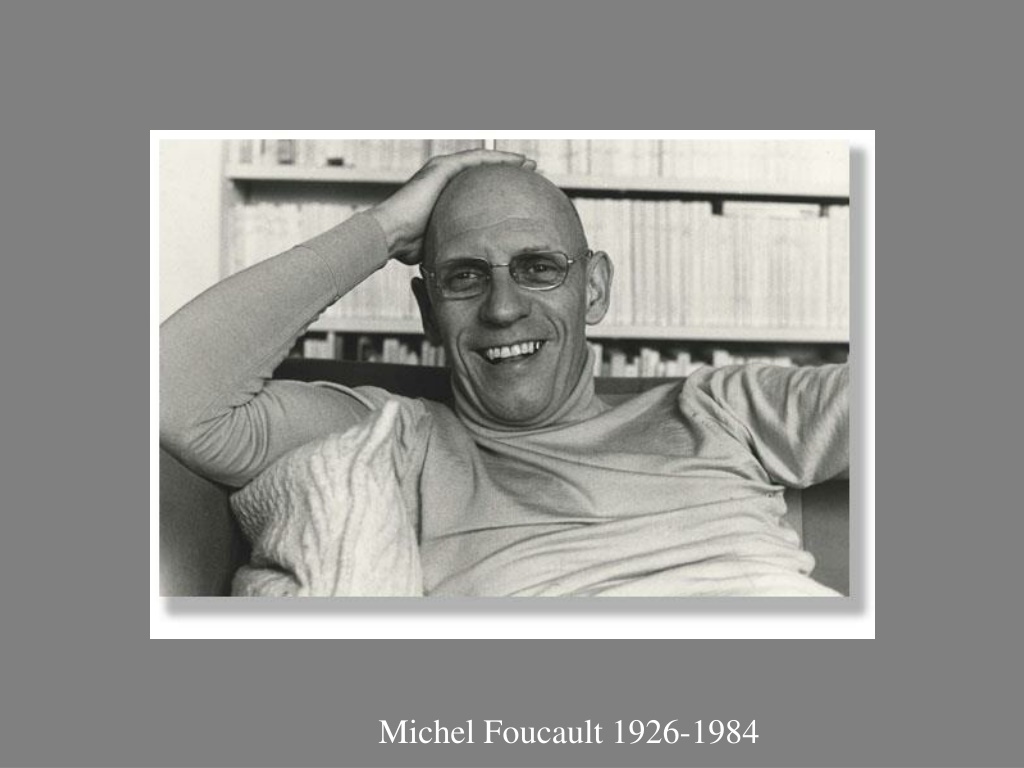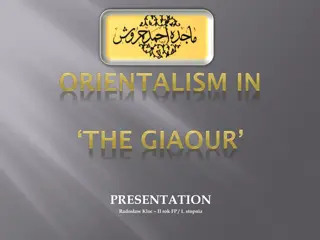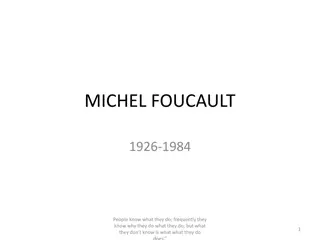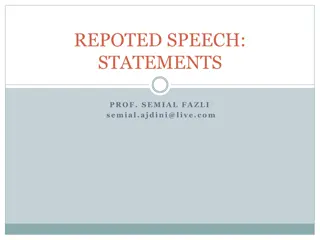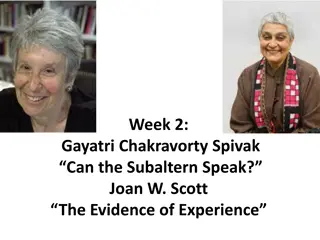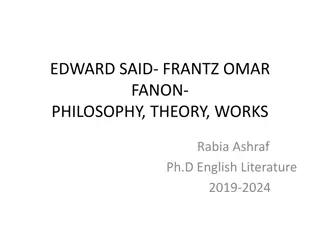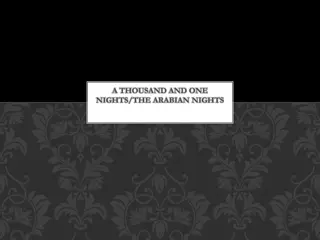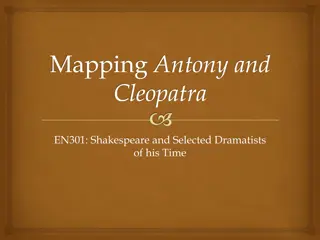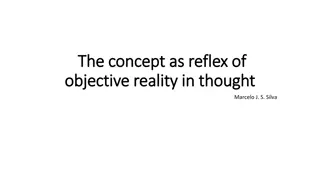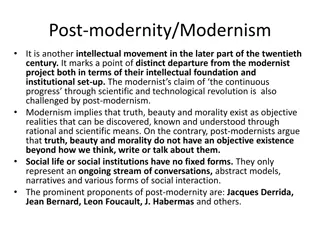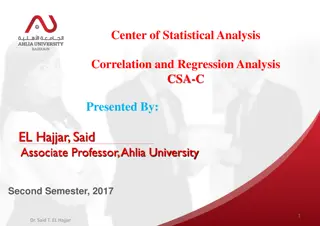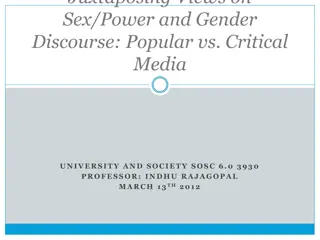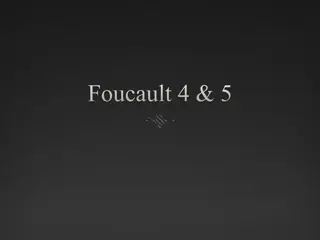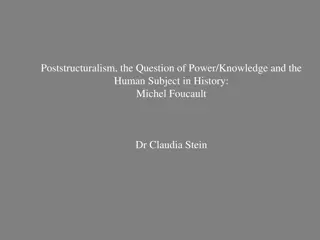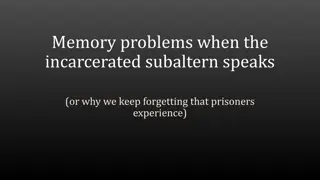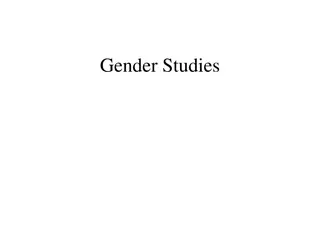Foucault and Said's Perspectives on Orientalism
Foucault and Said's ideas on Orientalism and power dynamics are discussed, highlighting the construction of the East in European thinking and the mechanisms of domination. Foucault's approach to avoiding categorization and his focus on individual self-domination are also explored. The lifelong political activism of Foucault and his engagement with intellectuals like Jean-Paul Sartre are examined. Additionally, the Marxist notion of power relations and class domination is analyzed in the context of different perspectives on the location of class power.
Download Presentation

Please find below an Image/Link to download the presentation.
The content on the website is provided AS IS for your information and personal use only. It may not be sold, licensed, or shared on other websites without obtaining consent from the author.If you encounter any issues during the download, it is possible that the publisher has removed the file from their server.
You are allowed to download the files provided on this website for personal or commercial use, subject to the condition that they are used lawfully. All files are the property of their respective owners.
The content on the website is provided AS IS for your information and personal use only. It may not be sold, licensed, or shared on other websites without obtaining consent from the author.
E N D
Presentation Transcript
Edward Said, Orientalism (1978)
What is the Orientalism ? An idea, produced both in and about the West, that holds principally that the East is both other and inferior
SaidsOrientalism (1978) examines the processes by which the Orient was, and continues to be, constructed in European thinking. Said argues that Orientalism is a style of thought based on the ontological and epistemiological distinction between the Orient and the Occident. But, most broadly, Said presents Orientalism as an institution for dealing with the Orient: dealing with it by describing it, viewing it, teaching it, settling it, ruling over it: in short, Orientalism as a Western style for dominating, restructuring, and having authority/power over the Orient.
Foucault and his obsession to avoid his own categorisation which he saw as an exercise of power: I think I have in fact been situated in most of the squares of the political checkerboard, one after the other and sometimes simultaneously: as an anarchist, leftist, ostensible or disguised Marxist, technocrat in the service of Gaullism, new liberal, and so forth None of these description is important by itself: taken together, on the other hand, they mean something. And I must admit I rather like what they mean.
Foucault on the overall aim of all his work: the interaction between oneself and others and in the technologies of individual domination, the history of how an individual acts upon himself (or herself); I am interested in the technologies of the self and a history of the subject.
A lifelong political activist engaged intellectuals Foucault and the Jean-Paul Sartre
Marxism and Its Notion of Power: 1.Concern with power relations as manifestations of a specific mode or configuration of class domination 2. Marxists are concerned with the links among economic, political, and ideological class domination. Different views on location of class power (e.g. in social relations of production, in control over the state, or in intellectual hegemony over hearts and minds (Gramsci). 3. Marxists note the limitations inherent in any exercise of power that is rooted in one or another form of class domination and try to explain this in terms of structural contradictions and antagonisms inscribed therein. For them all forms of social power linked to class domination are inherently fragile, unstable, provisional, and temporary and that continuing struggles are needed to secure class domination, to overcome resistance, and to naturalize or mystify class power. 4. Thus, Marxists address questions of strategy and tactics. They provide empirical analyses of actual strategies intended to reproduce, resist, or overthrow class domination in specific periods and conjunctures
Image:Tree.gif Structuralism: posits that elements of human culture must be understood in terms of their relationship to a larger, underlying system or structure (e.g.Clifford Geertz thick description in, Interpretation of Culture (1973)
Key claims of language theorists: 1. Languages are not confined to words but include any system of communication that uses signs. 2. A sign is composed of a signifier (vocal sound, image) and a signified (the mental concept or structure that speaker and listener share). 3. The structure precedes the signifier in existence (according to Saussure and that is what structuralists follow and what poststructuralists deny). 4. A signifier is established quite arbitrarily and bears no resemblance to the signified. 5. Every sign acquires meaning by belonging to a network of other signs.
Foucaults intellectual tools developed in close relation to language theory Method of Archaeology
Archaeology: is concerned with the analysis of language as a system of the possibility of expression; it is synchronic and does never try to explain change or the origin or distribution of power. He claims that at any given historical period, due to a particular language used, there are substantial constraints on how people are able to think (and consequently act). Foucault s idea is that very mode of thinking involves implicit rules (maybe not even formulated by those following them) that materially restrict the range of possible thoughts. This is the case for the past as it is for the present. THERE IS NO FREE SPEECH!
An historian-archeologist uncovers the underlying rules (maybe not even formulated by those following them) that materially restrict the range of possible thoughts (goes beyond a mere analysis of language systems) Method of archaeology
In any given culture and at any given moment there is always only one episteme that defines the conditions of possibility of all knowledge, whether expressed in theory or silently invested in a practice. Renaissance Episteme (1450-1650) Classical Episteme (1650-1800) Modern Episteme (1800-1966) Postmodern Episteme (late1960s -?) Where are we now? Post-Postmodern Episteme?
The traditional explanations as the spirit of the time, technology, social cultural influences struck me for the most part as being more than magical effective . solution is a new method : Geneology: .a historical causal explanation that is material, multiple, and corporeal. It is concerned with the analysis of historical emergence; it is conceptualised not as the culmination of events, or as the end of a process of development but rather as a particular momentary manifestation of chances or as a struggle between forces. Geneology embraces conflicts at a particular moment in time.
Geneology is a history of the present : The subject matter of this kind of history is the origins of present rules, practices or institutions that claim authority over us. IT starts from an investigation of the present. What claims authority over us now? What makes us think that certain ideas, practices, institutions in the present are normal .) The primary intend is not to understand the past for its own sake, but to understand and evaluate the present, particularly with a view to discrediting unjustified claims of authority.
Analysis of disciplinary power which emerges since the late 17th century Disciplinary power rivals an older sovereign power (the power of the right to kill and let live of the sovereign ruler (e.g. torture scene at the beginning of book shows this older power)
Foucaults ideas about power: It seems to me that power must be understood in the first instance as the multiplicity of force relations immanent in the sphere in which they operate and which constitute their own organization; as the process which, through ceaseless struggles and confrontations, transforms, strengthens, or reverses them; as the support which these force relations find in one another, thus forming a chain or a system, or on the contrary, the disjunctions and contradictions which isolate them from one another; and lastly, as the strategies in which they take effect, whose general design or institutional crystallization is embodied in the state apparatus, in the formulation of the law, in the various social hegemonies (Foucault, 1990, pp. 92-93).
Thus. Discipline (or disciplinary power) may be defined neither with an institution nor with an apparatus; it is a type of power, a modality for its exercise, comprising a whole set of instruments, techniques, procedures, levels of applications, targets. Aim:Discipline produces docile bodies
How does discipline function: 1. Hierarchical observation Foucault uses ideas of Jeremy Bentham, the founder of utilitarianism to show this .
Benthams idea of the prison panopticum Never realised that the time
.we induce in the inmate a state of consciousness and permanent visibility that assures the automatic functioning of power.
2. Normalising Judgement Individuals are judged not by the intrinsic rightness or wrongness of their acts but by where their actions are placed on a ranked scale that compares them to everyone else. We thus produce normal and abnormal bodies . We are subjected to a whole set of micro-penalties (regarding time, activities, speech, of body, of sexuality). We use discipline to punish non-conformity but also
3. Examination combines normative judgement with hierarchical observation to effect a normalising gaze through which individuals may be classified or judged. The examination is a prime locus of modern power/knowledge.
Foucaults Notion of Power: has to address not centralised and legitimate forms of power but techniques, which have become embodied in local, regional material institutions. should concern itself with the exercise or practice of power, its field of application and its effects, and not with questions of possession or conscious intention. Power is not a commodity or a possession of an individual, a group or a class, rather it circulates through the social body, and is exercised through a net-like organisation in which all are caught; power is strategic; at the same time intentional , yet non-subjective . Therefore analysis begins from micro-level in order to reveal the particular histories, techniques and tactics of power directed towards control of the human body Power produces knowledge knowledge produces power (Power/Knowledge); power is productive and not repressive. It often produces pleasure. So, we need to start investigation at what we think is good , what is pleasurable; what we consider normal and proceed from there. Power requires resistance. We need to consider resistance to power as part of the power game.
Biopower: I mean a number of phenomena that seem to me to be quite significant, namely, the set of mechanisms through which the basic biological features of the human species became the object of a political strategy, of a general strategy of power, or, in other words, how, starting from the 18th century, modern Western societies took on board the fundamental biological fact that human beings are a species. This is what I have called biopower.
A History of the Present to facilitate a transformation of the present: Real criticism consists in uncovering that thought and trying to change it: showing that things are not as obvious as people believe, making it so that what is taken for granted is no longer taken for granted. To practise criticism is to make harder those acts which are now too easy... [A]s soon as people begin to no longer be able to think things the way they have been thinking, then, transformation becomes at the same time very urgent, very difficult and entirely possible.
